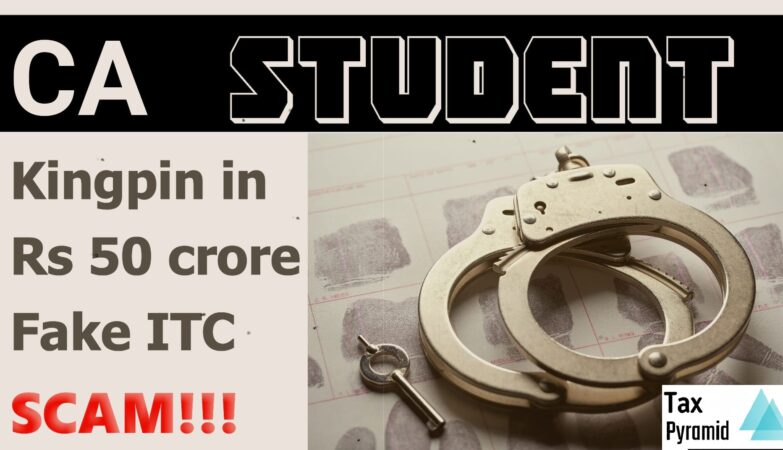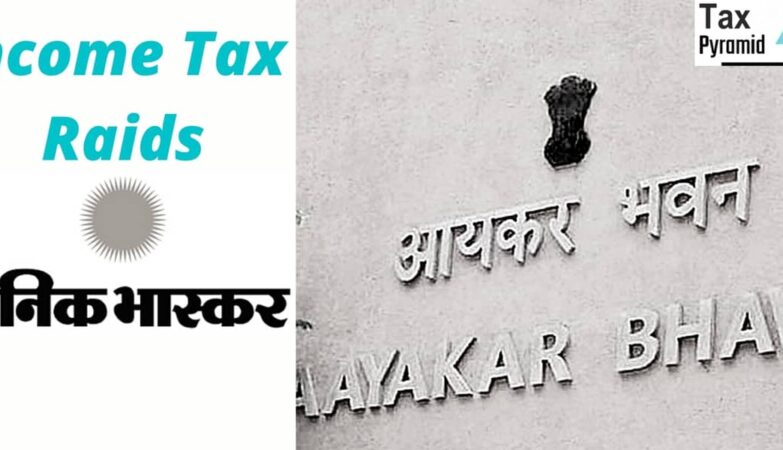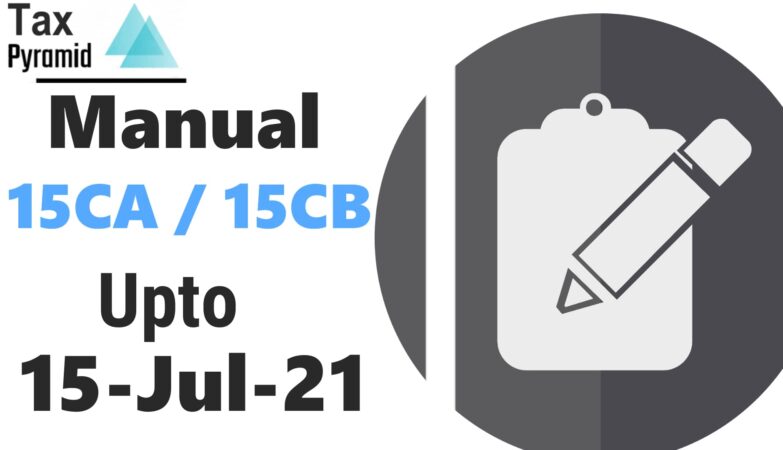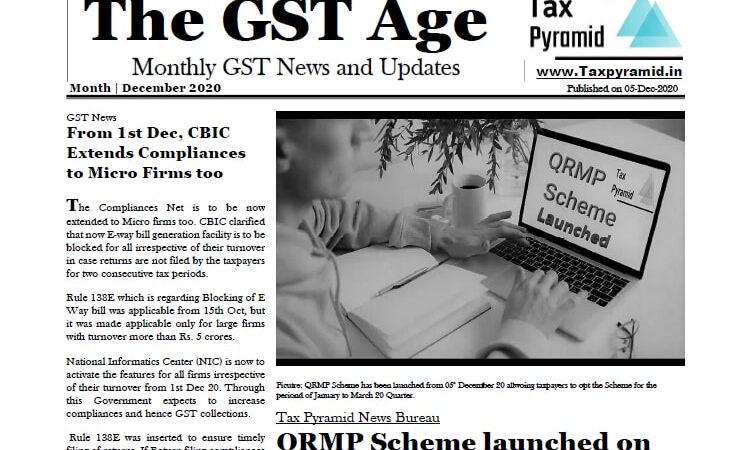Recently Directorate General of Goods and Services Tax Intelligence (DGGI) has been all over in news during the past few weeks for the GST scams they have busted mostly related to fraudulent GST input claims.
Fake GST ITC Scams busted in recent times
A major racket regarding claiming of fake GST Input Tax Credit has been busted in Delhi by the anti-evasion branch of Central GST Commissionerate, Delhi (East). Fake invoices along with fake e way bills amounting to Rs. 1278 crore without any actual movement of goods were generated and ITC was claimed against it. A person by name of Ashish Agarwal reported to be the mastermind of the scam was arrested under Section 132 of the CGST Act on 29th October 20.
Finance Ministry informed that seven bogus firms were floated for passing fake input tax credit. It was found that bogus invoices were raised against fictitious sale of milk products such as milk powder, Ghee etc.
In a separate instance, the Directorate General of GST Intelligence (DGGI) Gurugram Zonal Unit arrested Kabir Kumar, who is a resident of New Delhi, on charges of being involved in a similar fake ITC racket. The individual is charged for creating and operating fictitious firms on basis of forged documents. He is said to have passed fake input tax credit of over Rs 392 crore by issuing bogus invoices amounting to Rs 2,993.86 crore without any actual receipt or supply of goods or services.
CA Student Kingpin in Rs 50 Crore Fake ITC Scam

Among all of these cases, one that surprised everyone and gathered most of the news as well as discussion time was the one from the capital city of Gujarat state.
The arrest of CA student in Ahmedabad as a kingpin of Fake GST ITC scam which robbed Government of around Rs. 50 crores ITC was in every newspaper last month. He is said to have created 115 fake firms spread across nine GST Commissionerates in Gujarat that were detected by the DGGI. As per the investigation, these firms fake input tax credit to the amount of Rs. 50.24 crores were claimed. The firms created were raising bogus invoices without actual supply and passing on the ineligible ITC to other firms which in turn utilized the same against their GST payment.
The racket was busted with the help of IP addresses used at the time of return filing of all these fake firms already under suspicion lens and mobile numbers used for receiving OTP for GST related work. The actual physical location was thereby detected enabling the nabbing of offenders.
The kingpin of this racket is a student aspiring to be a future CA and this huge magnitude scam he managed to put in place.
The scam obviously raises a lot of eyebrows and also a serious cause of concern. Concern about our system, concern about the values which we are passing in the society when we see such a young educated lad of society indulged in it and also the concern how a novice if he could be called one, managed to pull this through when we boast of a world-class level GST system or at least we aspire it to be so. This is surely not a standalone case. The amount running in hundreds of crores and the level at which these scams are being operated sends a shocking wave down the spine.
Let me draw your attention to other incidence reported by newspapers in the first week of October. GST intelligence busted a nexus of fraud exporter companies in Ludhiana who were putting government at a double loss. They were claiming refund of IGST which was availed against fraudulent invoices of bogus companies. First the fake ITC was adjusted against supplies by paying no tax and then IGST input credit against it was later claimed as refund by exporters. ITC and cash refund of around Rs. 61 crores were reported to have been claimed through this scam.
The coming of so many cases to light in a single month is something what astonishes all. A Pune based person going by name of Tusshar Ashok Munoat being involved in trading fake invoices on commission basis, was arrested by DGGI Pune Zonal Unit. These fake invoices were later used to fraudulently avail ITC. Government has been robbed off 50 crores of ITC even in this scam. The firm was having registration across four states and was involved in civil work.
The Two-Pronged Approach Required
Experts are of the opinion that this is just the tip of the iceberg and there is a huge number of offenders operating and flourishing mostly at a small level. To stop these kinds of scams, a two-pronged approach is needed from the authorities.
Speaking of the first, the authority should be vigilant and burst these scams at every level and from every corner. Obviously, authority is doing its part as due to their efforts only these things are coming to our knowledge and involved people are getting arrested. At the same time, the existence of these practices in large number with hundred and thousand crores operation level also indicates towards the confidence they were being operated with. They were able to do so for such a long period right under the nose of the department and were caught when the amount was unnoticeably high.
The government has taken some measures in recent times though. For example, the recently introduced use of Aadhar for GST registration is being seen as an important tool for control over fake or bogus firm creations which are later used for availing fake ITC.
Extensive data mining and data analytics are proving to be quite effective in curbing these cases of fake firms and fraudulent practices.
But the government needs to step in with more tightening measures.
The other approach is the one in which we all have an important role to play along with the government. It is about creating awareness. When these examples are set where there are arrests, such examples need to be highlighted and awareness needs to be created regarding the consequences. The absence of fear of consequences is said to be the major reason behind the flourishing fake GST ITC Syndicate. The notion that one can get through needs to be killed. Clients need to be guided through all this and never encouraged to take laws or authorities lightly.
Tax Professionals and Consultants in these SCAMs
Tax practitioners and consultants obviously shouldn’t be part of this and rather should be helping the system in bringing down these malpractices in society. Those who are indulging in it intentionally are appealed to retreat their steps back before it’s late.
The government is deploying rigorous data analytics making the existence of these frauds difficult as evident from the number of cases and arrests in the past month. Even the government has indicated stringent law amendments regarding arrests.
The risk is not at all worth enough taking.
Tax Professionals unknowingly becoming part of Fake GST ITC Syndicate
The major cause of concern is those practitioners, professionals and auditors who fall into the trap due to their ignorance and unknowingly end up being part of it. One needs to be cautious while discharging his duties and make sure that even unintentionally he doesn’t become part of the Syndicate. You have to make sure that no one takes advantage of your inexperience. Let’s discuss what one can do and where one needs to be extra cautious.
1. KYC (Know Your Clients)
The most important thing a practitioner should do is to know his clients well and understand their businesses. You have to make sure they are doing actual business. Most of the above-discussed scams involved fake firms drawn in to generate bogus invoices without any actual supply or purchase. Unknown clients whom you are providing services without any visit to their place of business or without any iota of an idea as to what they are doing maybe an invitation to troubles.
Save time for high-value transaction entities to visit the factory or area of operation.
In the case of audits, conduct audit the way you are required and trained to do. Never make it a mere document review and signing exercise
2. Keep vigilant towards work received through online portals
There are so many portals such as Just Dial, Quikr, or Sulekha through which clients approach a practitioner. It has been observed that scamsters mostly approach CA firms through these portals to get accounts audited or for other certification work. They tend to keep on changing their CAs and advocates as there Is no dearth of service providers on these platforms. Work received through portals from other cities surely needs to be looked at through an eagle lens.
These portals are a good source of work but we should make sure that we don’t end up landing ourselves in a swamp difficult to come out from.
3. Red flag the work received at short notice:
It is an old saying that “Check him properly who shows excessive haste to get past through the gate.” The work received on short notice or with urgency, you have to be vigilant and careful with these work assignments. Urgency is not being denied or rejected. Obviously, there may be urgency or a fast-approaching deadline to a work, what is being explained here is that you need to be careful, not compromising on the quality of work, not skipping any necessary checks, and thereby satisfying yourself.
4. Ensure for actual sales
If you are just creating e-way bills for your clients without even giving a second thought and only on basis of trust then you need to pause and do some rethinking. Most of the frauds involved the generation of e way bills without the actual movement of goods. Ask yourself are you not generating one of these e-way bills against fake invoices? Generate e way bills only when you are confident of the transaction.
5. Audits or work received on a referral basis
Work which is received through someone is where we know nothing about the client or his business. Turning a blind eye in such cases can be an invitation to problem. Generally New practitioners get most of the work through reference. And it is also true the work which no one prefers to do or undertakes for some obvious reasons are forwarded to new entrants. Need to keep this possibility in mind as well. Further as told above audits are to be done with proper care and no relaxation or skipping of the required checks.
6. Don't get lured for easy work
New practitioners are the ones who are most vulnerable to these traps. Understandably they are looking for work and experience and therefore they tend to take with both hands whatever work comes their way. But at the same time, it is also to be ensured that we don’t offer ourselves as easy prey to these fraudsters. When we are new it’s true that the client would be dictating the terms but not those terms which are detrimental to the quality of work you are required to do. You are a trained professional and understand the law better. Equip yourself with knowledge.
Remember you are here for a long overhaul and you are to build a defining career for yourself. A mistake or negligence on your part may prove detrimental to your dream for which you have put in all your dear efforts.

CA Kalpak Kaplash














One thought on “Are you unknowingly being part of Fake GST ITC Syndicate?”